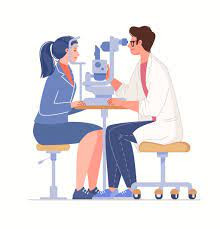You should consider seeing an eye specialist, also known as an ophthalmologist, in the following situations:
1. Vision Changes: If you notice sudden or gradual changes in your vision, such as blurriness, double vision, or difficulty seeing objects up close or at a distance.
2. Eye Discomfort or Pain:If you experience eye pain, discomfort, itching, burning, or a sensation of something being in your eye.
3. Redness or Irritation:If your eyes are consistently red, itchy, irritated, or have discharge.
4. Flashes or Floaters: If you suddenly start seeing flashes of light or dark spots (floaters) in your field of vision.
5. Sensitivity to Light: If you become unusually sensitive to light and experience discomfort even in normal lighting conditions.
6. Headaches:If you frequently experience headaches that are related to eye strain or changes in your vision.
7. Family History: If you have a family history of eye diseases, such as glaucoma, macular degeneration, or retinal detachment.
8. Chronic Health Conditions: If you have diabetes, high blood pressure, autoimmune disorders, or other chronic conditions that can affect your eye health.
9. Routine Eye Exams: Even if you're not experiencing any specific symptoms, regular eye exams are important for maintaining optimal eye health and catching potential issues early.
10. Children's Eye Health: Children should have their first comprehensive eye exam before starting school to detect any vision problems that might affect their learning and development.
11. Contact Lens Wear: If you wear contact lenses, regular check-ups with an eye specialist are essential to monitor eye health and ensure the right fit.
12. Medication or Treatment: If you are on medications or undergoing treatments that could potentially affect your eyesight, such as medications with ocular side effects.
13. Eye Injuries: If you experience an eye injury, regardless of how minor it might seem, it's important to get it checked by an eye specialist to rule out any hidden damage.
14. Preventive Care: Regular eye exams are important for preventive care, as many eye conditions and diseases can develop without noticeable symptoms in their early stages.
If you're unsure whether you need to see an eye specialist, it's always a good idea to consult with a medical professional or your primary care physician, who can provide guidance on when and if a referral to an eye specialist is necessary. Remember that early detection and treatment of eye conditions can often prevent further complications and preserve your vision.
For more eye-related queries, Consult Dr. Vaidya at one of the best Eye Specialist in Andheri and know more information visit in our hospital at Dr. Vaidya Eye Hospital.

